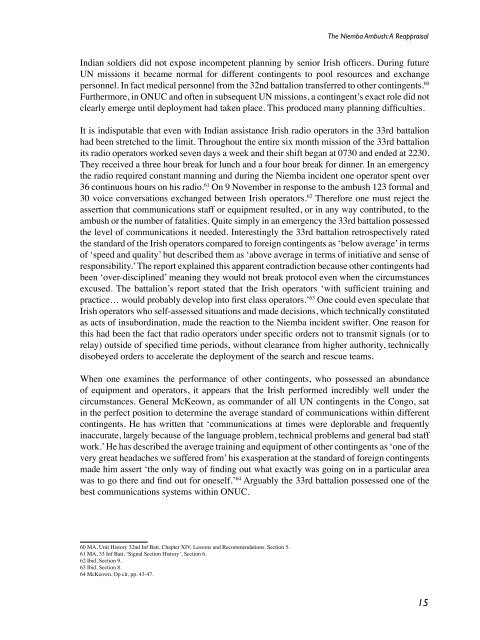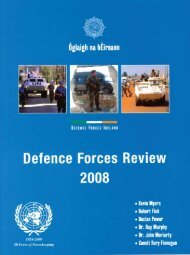The Niemba Ambush: A ReappraisalIndian soldiers did not expose incompetent planning by senior Irish officers. During futureUN missions it became normal for different contingents to pool resources and exchangepersonnel. In fact medical personnel from the 32nd battalion transferred to other contingents. 60Furthermore, in ONUC and often in subsequent UN missions, a contingent’s exact role did notclearly emerge until deployment had taken place. This produced many planning difficulties.It is indisputable that even with Indian assistance Irish radio operators in the 33rd battalionhad been stretched to the limit. Throughout the entire six month mission of the 33rd battalionits radio operators worked seven days a week and their shift began at 0730 and ended at 2230.They received a three hour break for lunch and a four hour break for dinner. In an emergencythe radio required constant manning and during the Niemba incident one operator spent over36 continuous hours on his radio. 61 On 9 November in response to the ambush 123 formal and30 voice conversations exchanged between Irish operators. 62 Therefore one must reject theassertion that communications staff or equipment resulted, or in any way contributed, to theambush or the number of fatalities. Quite simply in an emergency the 33rd battalion possessedthe level of communications it needed. Interestingly the 33rd battalion retrospectively ratedthe standard of the Irish operators compared to foreign contingents as ‘below average’ in termsof ‘speed and quality’ but described them as ‘above average in terms of initiative and sense ofresponsibility.’ The report explained this apparent contradiction because other contingents hadbeen ‘over-disciplined’ meaning they would not break protocol even when the circumstancesexcused. The battalion’s report stated that the Irish operators ‘with sufficient training andpractice… would probably develop into first class operators.’ 63 One could even speculate thatIrish operators who self-assessed situations and made decisions, which technically constitutedas acts of insubordination, made the reaction to the Niemba incident swifter. One reason forthis had been the fact that radio operators under specific orders not to transmit signals (or torelay) outside of specified time periods, without clearance from higher authority, technicallydisobeyed orders to accelerate the deployment of the search and rescue teams.When one examines the performance of other contingents, who possessed an abundanceof equipment and operators, it appears that the Irish performed incredibly well under thecircumstances. General McKeown, as commander of all UN contingents in the Congo, satin the perfect position to determine the average standard of communications within differentcontingents. He has written that ‘communications at times were deplorable and frequentlyinaccurate, largely because of the language problem, technical problems and general bad staffwork.’ He has described the average training and equipment of other contingents as ‘one of thevery great headaches we suffered from’ his exasperation at the standard of foreign contingentsmade him assert ‘the only way of finding out what exactly was going on in a particular areawas to go there and find out for oneself.’ 64 Arguably the 33rd battalion possessed one of thebest communications systems within ONUC.60 MA, Unit History 32nd Inf Batt, Chapter XIV. Lessons and Recommendations. Section 5.61 MA, 33 Inf Batt, ‘Signal Section History’, Section 6.62 Ibid, Section 9.63 Ibid, Section 8.64 McKeown, Op cit, pp. 43-47.15
<strong>Defence</strong> <strong>Forces</strong> <strong>Review</strong> <strong>2010</strong>The consensus asserts that the Niemba patrol did not carry wireless equipment and thisinfluenced the outcome of the ambush. Files for the 33rd battalion state clearly that the daybefore the ambush occurred Lieutenant Kevin Gleeson, commander of the ambushed patrol,received radio instructions from his battalion commander to clear and repair roads or bridgeswhich the Balubas, a local militant tribe, blocked or damaged. 65 Although the patrol did nothave radio equipment on their vehicles on the day of the ambush, even if they had possessedsuch equipment its practical use would have been limited. Battalion HQ would have onlybeen aware of the general area that the patrol operated in because the maps in possession ofthe 33rd battalion were ‘practically useless.’ 66 Other contingents faced similar problems. Afterthe ambush, the two survivors of the patrol avoided returning to the vehicles fearing Balubasremained in the area. In fact when the search party that found Private Fitzpatrick searched thearea, they became aware of ‘large numbers of Congolese moving about in the close bush’ andwhen Lieutenant Enright reported this to HQ he received an order to leave the area at once. 67Although the Balubas have been described as ‘a primitive people’ in other incidents Balubascaptured Belgian equipment and destroyed vehicles and communications equipment. Evenif a survivor returned to the vehicles and made a radio call, the extreme distances betweencompany units would have resulted in a rescue party needing hours to not only reach thegeneral area, but hours more to find the exact location of the patrol. One could argue thatequipping the vehicles with radio would have made absolutely no difference to the outcomeof the ambush, or the number of fatalities. Corporal Michael Bradley concurred with theseassertions. 68 Even in the Dáil, Kevin Boland, Minister for <strong>Defence</strong>, in response to criticismregarding the radio equipment issue, described it as ‘extremely doubtful if it would have beenof any avail in the circumstances prevailing on that occasion.’ 69 Although he did not elaborate,presumably his assertion had been formed on the basis of the aforementioned arguments.VehiclesThe aforementioned writers and authors who have created or sustained the consensus on theIrish patrol at Niemba have criticised the quality of army transport and patrol vehicles. Thiscriticism is unjustified because prior to the Congo mission the military needed vehicles capableof driving on Irish roads and in the Congo only cities had proper roads. Elsewhere in theCongo the ‘roads’ consisted of dirt tracks. The 32nd battalion’s report on vehicles describedthese tracks as having ‘four or five inches of dust or gravel on them’ but the condition of thedirt tracks deteriorated rapidly in the rainy season because the dust and gravel turned to mud. 70This forced the 33rd battalion to recommend a speed limit of 35mph to prevent vehiclesleaving the roads and causing accidents. 71 A Pakistani transport platoon is regularly cited by the32nd battalion for providing assistance. 72 Revealingly the 32nd battalion did not recommendthat any future Irish battalion (i.e. the 33rd battalion involved in the ambush) should arrivewith more vehicles, it only suggested sending more Irish drivers because ‘it is most likelythat all vehicles for future operations in the Congo will be supplied by the UN.’ 73 Perhaps65 MA, 33 Inf Batt, Chapter 5, Niemba, pp. 173-74.66 MA, 33 Inf Batt, p. 31.67 MA, 33 Inf Batt, Chapter 5, Niemba, Section 183.68 Corporal Michael Bradley. Interviewed 16 October 2008.69 Dáil Éireann - Volume 185 - 24 November 1960, Ceisteanna - Questions. Oral Answers - Congo Ambush.70 MA, Unit History 32nd Inf Batt, Chapter IX, Section 26, Suitability of Vehicles.71 MA, 33 Inf Batt, ‘Transport Section History’ Section 7.72 MA, Unit History 32nd Inf Batt, Chapter IX, p. 79.73 Ibid, Chapter XIV. Lessons and Recommendations. Section 4.16
















